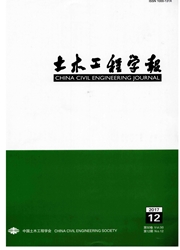

 中文摘要:
中文摘要:
以一31.1m×24.1m跨度的椭圆抛物面辐射式张弦梁结构为分析对象,考虑几何非线性、初始几何缺陷、材料弹塑性及活载的半跨布置,对其非线性屈曲性能进行研究。采用分批分阶段的拉索张拉施工方案,通过对张拉全过程的仿真分析,得到直接指导施工的各组拉索张拉力。研究表明:初始几何缺陷按最低阶屈曲模态分布时,稳定承载力系数并非最小;荷载不对称分布对结构的稳定性更为不利;材料非线性对结构稳定性影响较大;初始几何缺陷取短轴跨度的1/500较为适宜;各组拉索的实际施工张拉力与目标索力差别较小,张拉过程中,群索之间索力的相互影响不大。
 英文摘要:
英文摘要:
The nonlinear buckling behavior of an elliptic paraboloid radial beam string structure (BSS) of span 31.1 m × 24.1 m is investigated by introducing geometric nonlinearity, initial geometric imperfection, material elastic-plasticity and half-span distribution of live loads. The actual cable tension forces in different batches and stages are determined from simulation of the overall process, in order to guide the construction. The study shows that the coefficient of stable bearing capacity usually is not minimal when the initial geometric imperfection configuration is taken as the first order buckling mode, but rather, the unsymmetrical loading distribution and the material nonlinearity might have significant effects on the coefficient. A 1/500 of the span of minor axis could be appropriately taken as the maximum value of initial geometric imperfection. The simulation analysis of the construction demonstrates that the differences between the actual cable tension forces and the design values are very small, and the correlations between groups of cables during the tensioning are rather minor.
 同期刊论文项目
同期刊论文项目
 同项目期刊论文
同项目期刊论文
 期刊信息
期刊信息
